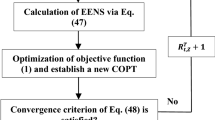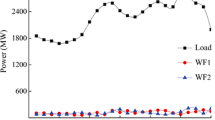Abstract
With the improvement of electricity markets, the gradual aggravation of energy shortage and the environment pollution, it is urgent to formulate a new model to precisely satisfy the system demand for energy and reserve. Currently, power system optimization dispatching is always formulated as a discrete-time scheduling model. In this paper, we first demonstrate through an example that the upper and lower bounds of spinning reserve offered by a unit, given in the discrete-time model framework as constraints, is unreachable. This causes the problem that the reserve delivery obtained by the discrete-time scheduling model cannot be carried out precisely. From the detailed analysis of the ramp rate constraints, it is proved that the reachable upper and lower bounds of spinning reserve in every period can be expressed as functions of two variables, i.e., generation level of unit at the start and end of this period. Thus, a new method is provided to calculate the upper and lower bounds of spinning reserve which are reachable in average. Furthermore, a new model based on this proposed method for joint scheduling of generation and reserve is presented, which considers the ability to realize the scheduled energy and reserve delivery. It converts the optimization based accurate scheduling for generation and reserve of power system from a continuous-time optimal control problem to a nonlinear programming problem. Therefore, the proposed model can avoid the difficulties in solving a continuoustime optimal control problem. Based on the sequential quadratic programming method, numerical experiments for scheduling electric power production systems are performed to evaluate the model and the results show that the new model is highly effective.
Similar content being viewed by others
References
Guan X H, Zhai Q Z, Feng Y H, et al. Optimization based scheduling for a class of production systems with integral constraints. Sci China Ser E-Tech Sci, 2009, 52(12): 3533–3544
Guan X H, Gao F, Svoboda A J. Energy delivery capacity and generation scheduling in the deregulated electric power market. IEEE Trans Power Syst, 2000, 15(4): 1275–1280
Zhai Q Z. Research on the model and algorithms for hydrothermal scheduling. Doctoral Dissertation. Xi’an: Xi’an Jiaotong University, 2005. 1–22
Stacke F, Cuervo P. A combined pool/bilateral/reserve electricity market operating under pay-as-bid pricing. IEEE Trans Power Syst, 2008, 23(4): 1601–1610
Wang J X, Wang X F, Wu Y. Operating reserve model in the power market. IEEE Trans Power Syst, 2005, 20(1): 223–229
Gan D Q, Litvinow E. Energy and reserve market designs with explicit consideration to lost opportunity costs. IEEE Trans Power Syst, 2003, 18(1): 53–59
Gao Y L, Gao F, Pan J Y, et al. Self-scheduling for electrical energy balance and output power control of energy-intensive enterprises. Proc CSEE, 2010, 30(19): 76–83
Flynn M, Sheridan W P, Dillon J D, et al. Reliability and reserve in competitive electricity market scheduling. IEEE Trans Power Syst, 2001, 16(1): 78–87
Salam M S, Nor K M, Hamdam A R. Hydrothermal scheduling based Lagrangian relaxation approach to hydrothermal coordination. IEEE Trans Power Syst, 1998, 13(1): 226–235
Sand G, Engell S. Modeling and solving real-time scheduling problems by stochastic integer programming. Comp Chem Eng, 2004, 28(6): 1087–1103
Guan X H, Guo S G, Zhai Q Z. The conditions for obtaining feasible solutions to security-constrained unit commitment problems. IEEE Trans Power Syst, 2005, 20(4): 1746–1756
Fisher M L. The Lagrangian relaxation method for solving integer programming problems. Manage Sci, 2004, 50(12): 1861–1871
Gooi H B, Mendes D P, Bell K R W, et al. Optimal scheduling of spinning reserve. IEEE Trans Power Syst, 1999, 14(4): 1485–1490
Gao Y L, Gao F, Zhai Q Z, et al. Balance analysis of large-scale power consuming corporation. Proc CSEE, 2009, 29(19): 70–77
Gao Y L, Pan J Y, Ji G L, et al. A time-series modeling method based on the boosting gradient-descent theory. Sci China Tech Sci, 2011, 54: 1325–1337
Wang C J, Encinas N, Galiana F D. Demand-side reserve offers in joint energy/reserve electricity markets. IEEE Trans Power Syst, 2003, 18(4): 1300–1306
Yamin D H Y. Spinning reserve uncertainty in day-ahead competitive electricity markets for GENCO’s. IEEE Trans Power Syst, 2005, 20(1): 521–523
Ge J, Wang F, Zhang L Z. Spinning reserve model in the wind power integrated power system. Autom Elec Power Syst, 2010, 36(6): 32–36
Meng X X, Han X S. Discussion on reserve caused by uncertain factors. Power Syst Technol, 2005, 29(1): 30–34
Tan L N, Zhang B H. Reserve capacity for accident in power market environment. Proc CSEE, 2002, 22(11): 54–58
Li W Y, Zhou J Q, Yan W, et al. Reliability based method for spare planning of power system equipment. Proc CSEE, 2006, 26(15): 7–11
He Y X, Huang W J, Tan Z F, et al. A study on demand of electricity reserve market in marketing operation. Proc CSEE, 2004, 24(3): 46–50
Yu Y X, Li P. The impact of weak interaction of bulk power grids to damping and dynamic stability of power systems. Proc CSEE, 2005, 25(11): 6–11
Author information
Authors and Affiliations
Corresponding author
Rights and permissions
About this article
Cite this article
Gao, Y., Pan, J., Yang, Z. et al. Optimization based accurate scheduling for generation and reserve of power system. Sci. China Technol. Sci. 55, 223–232 (2012). https://doi.org/10.1007/s11431-011-4631-6
Received:
Accepted:
Published:
Issue Date:
DOI: https://doi.org/10.1007/s11431-011-4631-6




